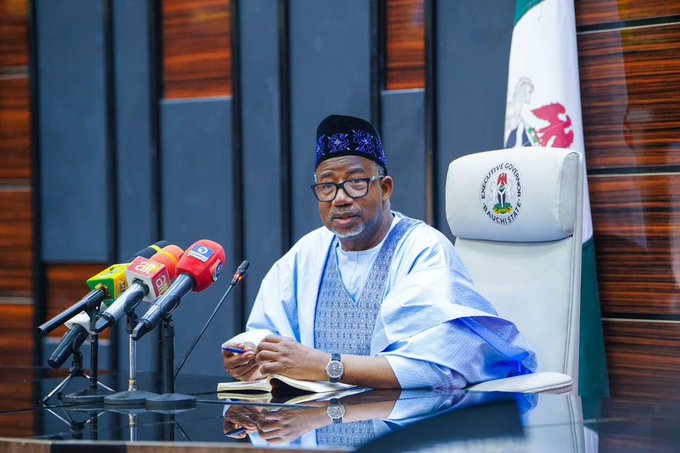Bauchi State Governor Bala Mohammed has launched a stinging critique of President Bola Ahmed Tinubu’s administration, accusing it of pursuing policies that exacerbate poverty and hardship across Nigeria. In a rare public admission, the governor revealed that his strained relationship with the president stems from these contentious policies, which he claims are hurting Nigerians, especially in the North.
Speaking during a courtesy visit to Sheikh Sani Yahaya Jingir, a respected Islamic leader and advocate of the Muslim-Muslim ticket, Governor Mohammed did not hold back. “Tinubu and I are not on good terms because his policies are causing hardship for the citizens,” he declared.
Northern Hardships Under Tinubu’s Watch
The Bauchi governor specifically criticized recent tax reforms proposed by the Tinubu administration, highlighting their disproportionate impact on northern states. According to him, the economic realities in the North make it particularly vulnerable to policy changes that reduce federal allocations or increase financial pressures.
“The North, unfortunately, heavily relies on federal allocation to survive. The reforms he is proposing will put the region under dire strain,” Mohammed warned, painting a bleak picture of what lies ahead if these policies are implemented without revisions.
Many northern states, including Bauchi, depend significantly on federal allocations due to their limited internally generated revenue. Analysts have often pointed out the disparity in economic development between Nigeria’s regions, with the North facing significant challenges in agriculture, education, and industrialization. Governor Mohammed’s comments underline the fear that Tinubu’s economic policies could widen this gap.
Sheikh Jingir’s Role as Mediator
In an emotional plea, Mohammed called on Sheikh Jingir to use his influence to mediate between the government and the northern states. “Thank God you are alive today to use your wise words of wisdom in this regard because us politicians tend to use harsh words in our approach,” he said, emphasizing the cleric’s role in fostering dialogue and encouraging the president to reconsider his policies.
Mohammed expressed confidence in Sheikh Jingir’s ability to navigate sensitive issues with diplomacy and wisdom. The cleric has previously played key roles in promoting unity and bridging divides in Nigeria’s volatile political and religious landscape.
Policy Backlash Growing
This is not the first time Tinubu’s policies have come under fire. Since assuming office, the president has introduced a series of reforms aimed at addressing Nigeria’s economic woes, including the removal of fuel subsidies and tax hikes. While some have praised these moves as necessary steps toward long-term recovery, critics argue they have worsened the living conditions of ordinary Nigerians.
The removal of fuel subsidies, in particular, has sparked widespread protests and increased the cost of living. Inflation has soared, and many Nigerians now struggle to afford basic necessities.
Governor Mohammed’s outspoken criticism adds to the growing chorus of voices calling for a more inclusive and compassionate approach to governance.
Regional Concerns
Mohammed’s remarks also highlight the broader tension between Tinubu’s administration and northern leaders. The North has long grappled with economic challenges, and many feel that federal policies often fail to account for the region’s unique circumstances.
By publicly challenging the president, Mohammed has positioned himself as a champion of northern interests. “We need a government that listens to the people and prioritizes their needs,” he said, urging the Tinubu administration to adopt a more inclusive governance style.
The governor’s comments reflect a deep frustration with what many see as a disconnect between the federal government and the realities on the ground in northern Nigeria.
Call for Change
Governor Mohammed stressed the need for urgent action, warning that continued disregard for the plight of vulnerable Nigerians could lead to greater unrest. “These policies are not just numbers on a budget; they are affecting real people, real families,” he said.
He reiterated his commitment to advocating for policies that address poverty and inequality, particularly in economically disadvantaged regions.
While Tinubu has defended his policies as necessary for Nigeria’s long-term stability, critics argue that the government must find ways to cushion the immediate impact on ordinary citizens.
A Nation at a Crossroads
Nigeria’s current economic challenges underscore the complexity of governance in a country as diverse as it is divided. With tensions mounting between the federal government and northern leaders, the need for dialogue and compromise has never been greater.
Governor Bala Mohammed’s criticism may be a wake-up call for the Tinubu administration to reevaluate its approach. As Sheikh Jingir mediates, Nigerians will be watching closely to see whether the government will adjust its policies to address the growing discontent.
For now, the rift between two prominent political figures reflects the broader struggles of a nation searching for solutions to its deepening economic woes.

